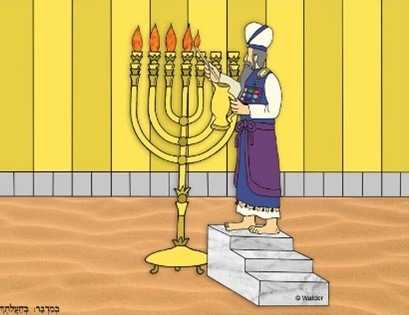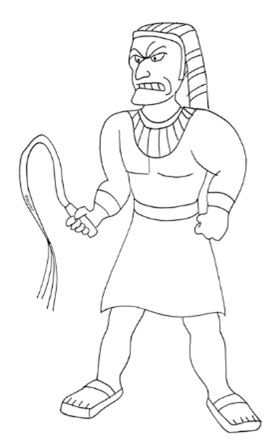Parshas Tisa
No Need To Worry Because…
“Then I will remove My Hand, and you will see My Back, but My Face shall not be seen.” (33:23)
Hashem told Moshe, “And you will see My Back, but My Face shall not be seen”. The Chasam Sofer explains what Hashem was telling Moshe. Certain events will occur in the world that are unexplainable. They may even seem to be bad. However, at some later time, in the future, Hashem’s plan will become clear. Then it will become understandable that Hashem has been directing all the events for our benefit. Events that seemed to be bad were in reality very beneficial.
There was a Holocaust survivor who went to Toronto, Canada, after the war. He tried to get a job as a shamash in a local shul where everyone spoke Yiddish. He almost got the job. However, in the end, he did not get the job because he couldn’t speak and read English. This man was very dejected! His wife told him that he should at least become a peddler. He listened to his wife and started selling rags. He made a little money and started selling better items. Then he started selling scrap metal. Eventually, he became a multi-millionaire, building the largest scrap metal business in Canada. Had he gotten the job as a shamash he would not have become wealthy. This man, Joseph Tannenbaum dedicated his life to giving tzedakah. (Wings of Faith written by Rabbi Yosef Tropper).
When the Chasam Sofer was a young boy, he learned Torah in the city of Mainz, Germany. He ate his meals with a family in the neighborhood. When the French armies invaded the city, the people of the city were ordered to board soldiers in their homes and to give them meals. The French soldier who stayed in the house where the Chasam Sofer ate his meals became friendly with the bright young boy. Soon after, the French soldiers left the city. Why did Hashem orchestrate events so that this particular soldier stayed in the house where the Chasam Sofer ate his meals? The reason was unknown. Thirty years later, Hashem’s plans became clear. A war broke out. Because of certain events the Chasam Sofer was jailed on serious charges of espionage. The charges were false but if indicted, the Chasam Sofer would be killed. The Chasam Sofer was brought before a military tribunal. To the Chasam Sofer’s surprise and amazement, the chief military judge treated him compassionately. The case against him was dropped. It turned out that the chief judge was that soldier who 30 years earlier had been impressed by the young Chasam Sofer and had become his friend. He knew that the Chasam Sofer was not a spy. It took 30 years to understand why Hashem brought these two people together in the same house (Talelei Oros by Rabbi Yissachar Dov Rubin).
The story of Purim happened the same way. Seemingly unrelated and illogical events took place. Queen Vashti was executed on a whim. Esther was taken to become the Queen against her will. Haman rose from lowliness to a position of great power. Even Haman’s decrees were confounding. However, later when the story eventually unfolded, it became clear that all these events were pieces of a puzzle that together led to the salvation of the Jews.
Rav Elimelech Biderman quotes the Alshich. Haman came to the courtyard to ask King Achashverosh to hang Mordechai. Haman arrived at the exact moment that he was needed, not a minute too early and not a minute too late. King Achashverosh could not sleep. He asked his servant to read him the royal book of records. When he heard that Mordechai had saved his life, he asked if Mordechai had been rewarded. His servant replied that Mordechai had not been rewarded. Just then, Haman arrived in the courtyard. The Alshich points out that had Haman arrived just one minute earlier he would have heard King Achashverosh ask if Mordechai had been rewarded. Hearing the name Mordechai, he never would have suggested that Mordechai be dressed in royal garments and be paraded while riding the king’s horse. Then Haman would not have led Mordechai on the king’s horse, demeaning himself. Had Haman come just a minute later, then the king would have asked his servant who was with him how to reward Mordechai. His servant would not have suggested what Haman had, and Haman would not have had to demean himself by leading Mordechai. Hashem arranged it for Haman to come at the exact moment needed for Haman to be demeaned and for the salvation to begin! Hashem runs the show even if it seems hidden.
Rabbi Biderman points out that a person may get upset if he misses a bus by a minute. He shouldn’t feel that way. Hashem has a good reason for what He does. Hashem orchestrates events to the second.
Rabbi Biderman also quotes a Malbim. Mordechai saved King Achashverosh’s life by revealing Bigsan and Seresh’s plot. What did the king do? He had Mordechai’s deed recorded in the royal book of records. The Malbim points out that this action was very unusual. If someone saves your life, would you just write it down in a book of records? Wouldn’t you take your savior to the treasury and tell him to help himself? The Malbim explains, had Achashverosh rewarded Mordechai right away, then he would have already repaid his debt. Then, when Haman told Achashverosh that he wanted to hang Mordechai, Achashverosh would have permitted it. Therefore, Hashem orchestrated that something unusual be done. Instead of rewarding Mordechai, Achashverosh had Mordechai’s deed written down in the book of records. Later, when Mordechai truly needed a “favor” that is when he received his reward.
Rabbi Biderman says that this teaches us a VERY important lesson! One may feel that he davened so much and said Tehillim! Where is his salvation? It seems as if he was not answered. The answer is that Hashem records his prayers. At the precise moment that he needs it the most then Hashem will answer his prayers.
Hashem told Moshe that while things are happening, we often can’t understand them. Only, after time, will events make sense. We should never worry about all that is swirling around us.
Hashem is always watching over us. Hashem arranges events
to occur at the exact moment that they are needed to help us.












